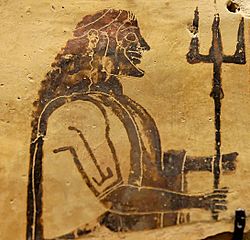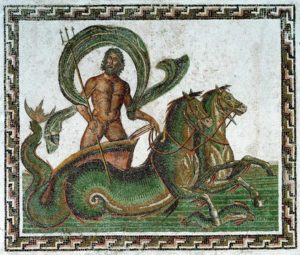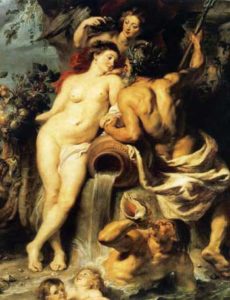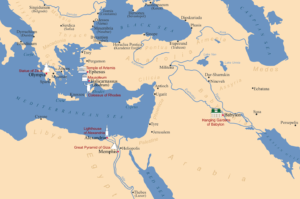
A map of the ‘Seven Wonders of the World’ per the ancient Greeks. Image retrieved from Wikipedia Commons
Not a big surprise here. I like to read ancient world historical fiction. Some folks recently asked me at my Facebook event: what kind of research did you do for Poseidon and Cleito? That gave me the idea of doing this short post to share some of the books that influenced my writing.
I re-read some of the classical mythology and literature that I had first enjoyed in high school and college: Edith Hamilton’s Mythology and Homer’s The Iliad and The Odyssey. I also read for the first time Plato’s Timaeus and Crtias dialogues, of course with special attention to the passages concerning the Atlantis story.
I took a pretty broad approach to non-fiction, or in some cases “non-fiction” on the subject of Atlantis: Lewis Spence’s The History of Atlantis and Frank Joseph’s The Destruction of Atlantis, among others, and I even plodded through Edgar Cayce’s Atlantis with his accounts of strange, psychic readings. I also read up on ancient Greek history, costume and daily life.
All of those sources helped with imagining the setting of the story, though I found that reading really good historical fiction probably helped even more.
Here’s a list of some of my very favorites in case you’re interested in the time period.
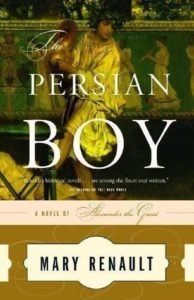 Mary Renault’s series on the history of Alexander the Great is absolutely fantastic. Probably because of its intriguing perspective, I enjoyed the most The Persian Boy, which is told from the point-of-view of Alexander’s eunuch attendant and lover Bagoas. The book certainly has strong romantic elements, but it’s not a romance novel in the modern sense. The story follows the tragic history of Bagoas, a boy who is castrated and bought and sold to various masters after his chieftain father is overthrown and murdered. He ends up in Alexander’s household, and the story chronicles the conquest of the Persian empire, Alexander’s ill-fated march into India, and the last days of his life in Babylon, all through the eyes of an unlikely and compelling storyteller.
Mary Renault’s series on the history of Alexander the Great is absolutely fantastic. Probably because of its intriguing perspective, I enjoyed the most The Persian Boy, which is told from the point-of-view of Alexander’s eunuch attendant and lover Bagoas. The book certainly has strong romantic elements, but it’s not a romance novel in the modern sense. The story follows the tragic history of Bagoas, a boy who is castrated and bought and sold to various masters after his chieftain father is overthrown and murdered. He ends up in Alexander’s household, and the story chronicles the conquest of the Persian empire, Alexander’s ill-fated march into India, and the last days of his life in Babylon, all through the eyes of an unlikely and compelling storyteller.

There are a good number of re-tellings of the Trojan War, but David Malouf’s quiet novel, focused on the days following Achilles’ murder of the Trojan Hector, stood out to me. Ransom is more about the humanity of Hector’s father King Priam, and ultimately Achilles himself, rather than scenes of battle and military strategizing. Malouf’s writing style is simple, evocative, and powerful. His choice of giving equal time to the less explored character of Priam also pulled me in.
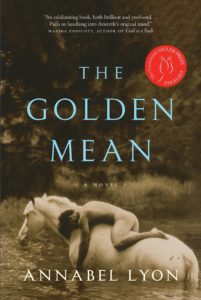 So by now you can tell I have a preference for character-driven, atmospheric stories over sword-clashing adventures. I do like action-adventures from time-to-time, but I really have to connect with the heroes to enjoy the story. If what drives them is simply “for the honor of home and country,” I just can’t work up much enthusiasm.
So by now you can tell I have a preference for character-driven, atmospheric stories over sword-clashing adventures. I do like action-adventures from time-to-time, but I really have to connect with the heroes to enjoy the story. If what drives them is simply “for the honor of home and country,” I just can’t work up much enthusiasm.
That’s why I loved Anabel Lyon’s The Golden Mean, which reimagines two complex characters from early Greek history: Aristotle and his young pupil Alexander. The portrayal of each man’s struggles close to home are expertly realized: for Aristotle, a nervous condition which modern medicine would likely call depression, for Alexander, a broken family domineered by his ruthless father. The “Golden Mean” here has to do with emotional moderation: the balance between despair and hope and the exercising of cruelty versus compassion.
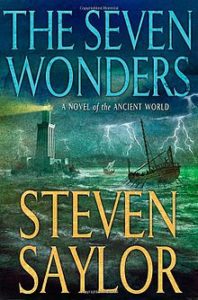 Over the years, I’ve been happy to discover a subset of ancient world books with mystery elements. I grew up reading mysteries, and in my 20s read a lot in the area of gay fiction. Ancient world + mystery is a winning formula for me. Ancient world + mystery + gay characters is even better, which is why I singled out Steven Saylor’s Roma Sub Rosa series and The Seven Wonders of the World.
Over the years, I’ve been happy to discover a subset of ancient world books with mystery elements. I grew up reading mysteries, and in my 20s read a lot in the area of gay fiction. Ancient world + mystery is a winning formula for me. Ancient world + mystery + gay characters is even better, which is why I singled out Steven Saylor’s Roma Sub Rosa series and The Seven Wonders of the World.
The story follows a young man’s (Gordianus) journey of a lifetime to visit each of the seven wonders with his tutor Antipater. At each site, there is some intrigue for Gordianus to uncover, and in Saylor’s style, a bit of camp and humor. I don’t mean to overstate the gay content. There’s just a touch of that, but I like that the world of Gordianus, the ‘finder’ or detective of the Roma Sub Rosa series, includes gay and bisexual characters.
Some other historical mysteries that I’ve liked are Gary Corby’s Athenian Mysteries series and Nick Drake’s Rahotep series set in Egypt.
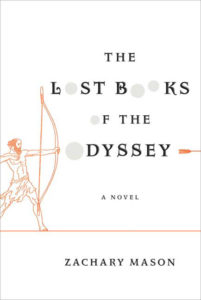 One last pick from me: I really enjoyed Zachary Mason’s ambitious “excavated” stories about Odysseus and some of the other heroes of the Trojan War. His writing style is gorgeously evocative of the time period, and what I also appreciated was the unexpected but believable twists to the well-known source material. For example, Odysseus, returning to Ithaca after ten years of adventures, finds Penelope remarried, and shrugs off that they have both moved on with their lives, which, for what I’ve come to understand about the world, feels like a more likely outcome than murdering his wife’s suitors and settling back into married life.
One last pick from me: I really enjoyed Zachary Mason’s ambitious “excavated” stories about Odysseus and some of the other heroes of the Trojan War. His writing style is gorgeously evocative of the time period, and what I also appreciated was the unexpected but believable twists to the well-known source material. For example, Odysseus, returning to Ithaca after ten years of adventures, finds Penelope remarried, and shrugs off that they have both moved on with their lives, which, for what I’ve come to understand about the world, feels like a more likely outcome than murdering his wife’s suitors and settling back into married life.

